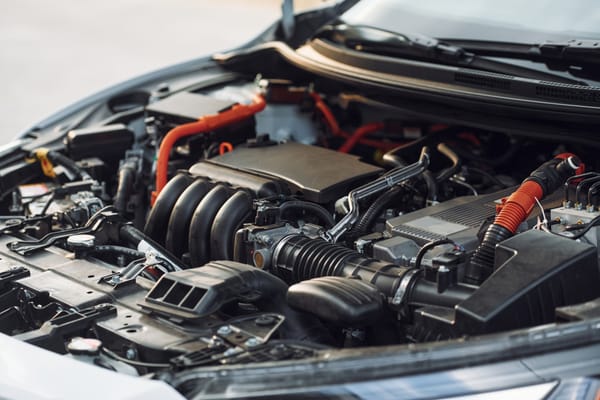Decoding Car Financing Terms : What They Mean and Why They Matter

Car finance. Ugh.
It's a world of confusing terms. "Amortisation." "Encumbrance." "Forced-Sale Value."
Ni nini hizo?🙄🙄
It often feels like you need a law degree just to understand the loan agreement. These big words can be the difference between a great deal and a massive financial headache.
But usijali. Peach Cars is here to break it all down.
The Basics: What Financing Really Means
Let's start easy.
Car financing in short ni loan ya kubuy ndai. You pay a deposit, and a financier pays the rest. You then pay the financier back in small bits (instalments) every month.
A financier is the one giving you the car loan. This could be:
- A Bank (like KCB, Stanbic, or NCBA).
- A SACCO (if you're a member).
- A Microfinance Institution (MFI) such as EasyGari
Key Terms That Affect Your Approval
Before they give you a single shilling, financiers will check if you're a "safe bet." They use these terms to decide.
1. Credit Score
This is your financial report card.
It tells lenders how well you've handled past loans. Have you been paying on time? Or have you been defaulting?
According to Metropol CRB, one of Kenya's credit reference bureaus, a good score (typically 600+) gets you better rates. A bad one? You might not qualify at all.
2. Deposit Ratio
This is the down payment, what you pay upfront.
- Financiers rarely pay 100% of the car's price.
- They'll ask you to pay a deposit upfront, usually 20-30%.
- Some lenders, however, may accept as low as 10% especially if the car is newer.
The bigger your deposit, the less you borrow — and the lower your monthly payments.
3. Loan-to-Value (LTV)
This is the flip side of the deposit. This shows how much the bank will lend compared to the car's value.
- If a car is valued at Ksh 1M and the bank has an 80% LTV, they will lend you a maximum of Ksh 800,000.
- Your deposit is the remaining Ksh 200,000.
Keep this in mind. It's almost never 100%.
4. Valuation Report
This isn't the price you agreed on with the seller.
A valuer is a neutral expert hired by the lender. They inspect the car and write an independent report on their assessment of the condition and value.
The lender relies on the valuer's report, not the seller's.
What They Don’t Tell You About Ownership
This is where things get tricky. You have the keys, but who owns the car?
1. Joint Ownership (The Logbook Surprise)
When you finance a car, you don't own it. Not yet.
The logbook will be registered jointly. It will include:
- Your Name
- Financier's Name.
This is the lender’s security. It means you can't sell the car bila their permission.
2. Encumbrance
This is the official-sounding word for the above.
- An encumbrance is a legal claim on the asset (your car).
- A car under encumbrance is tied to a loan.
- It is that thing that stops you from transferring ownership while the loan is active.
- It's also recorded on the NTSA TIMS portal.
That means, if you're buying a used car, always check for encumbrance through NTSA's Tims eCitizen portal. You don't want to buy someone else's debt — trust us, we've seen it happen.
4. Discharging the Loan
This is the best part.
- Once you pay your final instalment, the bank "discharges" the loan. That’s, they release the encumbrance.
- They write a letter giving up their claim.
- You take this letter to NTSA to remove their name.
- Your name becomes the only one on the logbook.
- Finally, the logbook is 100% yours, and that's when you truly own the ride
Understanding the Fine Print: Fees and Charges
Lenders don't just lend money for free. There are costs — and some of them are sneaky if you're not paying attention.
1. Processing Fees
This is an admin fee. You pay it just to apply for the loan.
It’s usually 1-5% of the loan amount, depending on the lender. And guess what? For some lenders, you may have to pay it even if your loan is rejected.
For example, on a Ksh1 million loan, this could mean paying up to Ksh50,000 before disbursement. However, many lenders will allow you to capitalise fees i.e. the fee is added to the loan amount so you don’t have to pay anything upfront.
2. Interest Rate (Flat vs. Reducing Balance)
This is one of the most important things to look at when taking a car loan.
- Flat Rate: The interest is calculated on the entire loan amount for the whole repayment period — not on what you still owe.
- For example, if you borrow Ksh1,000,000 at a 10% flat rate for 3 years, you’ll pay 10% of Ksh1,000,000 every year, even though the balance keeps going down as you make payments.
- This means the total interest cost stays the same throughout the loan, making it more expensive overall, even though it may look simple or cheaper upfront.
- Reducing Balance Rate: The interest is charged only on the remaining loan balance. As you pay off the loan, the balance reduces — and so does the interest charged each month.
Always ask your lender: “Is this a flat rate or a reducing balance rate?”
Experts generally recommend reducing balance loans because you only pay interest on what you still owe, making them cheaper in the long run.
3. Late Payment Penalties
What happens if you're a few days late on your payment?
Depending on the lender, you may have a grace period before penalties start applying. This can be a fixed fee or an interest charge on the missed amount. Among the car loan questions people ask, late payment penalties vary but often fall within the 1–5% range of the monthly instalment.
Additional interest may accrue on the overdue amount, compounding the cost. It adds up haraka sana. So, you want to budget well so you don’t miss your payments.
Forced-Sale Value and Why It’s a Big Deal
This term confuses everyone. But it's the key to understanding your loan.
Market Value vs. Forced-Sale Value (FSV)
- Market Value is the car's real price. It's what you’d get selling your car privately today.
- Forced-Sale Value (FSV) is the auction price. The price the car would fetch if it were to be sold quickly without enough time for sufficient marketing. It's the "we need cash sasa hivi" price. It is always lower than the market value and is typically determined by an independent valuer appointed by the lender.
Why It Matters to You
Lenders don't typically lend based on market value. They lend based on FSV.
Why? Because they are cautious.
- If you’re unable to pay, they want to know they can sell the car fast at an auction and get their money back.
- So, if a car's market value is Ksh 1M, the FSV might be Ksh 800,000. And say, if the bank finances 80% LTV on the Ksh 800,000 then your loan amount will be Ksh 640,000), not the 1M.
This means your deposit just got a lot bigger.
When Things Go Wrong: Repossession and Default
Life happens. Sometimes you can't make a payment. But you need to know your rights.
- Default - This is the polite word for "failing to pay." If you miss several payments (usually 2-3 months but could be much less depending on the lender), you are in default. This is when the serious letters and phone calls start.
- Repossession is when the lender takes back the car. They can do this legally once you default, as per the Chattels Transfer Act. You'll get warnings first — usually letters, calls, and SMS reminders. But if you ignore them or you fail to get into an agreement, a tow truck will show up. Probably at the worst possible time.
- Grace period is your buffer. If you know you'll be late, call the bank immediately. Some lenders will extend the grace period or restructure your loan. But only if you communicate early, before the deadline passes.
- Settlement clause is the total amount you owe if you want to clear the loan early or recover a repossessed car. It includes the outstanding balance, accrued interest, penalties, and any fees incurred. Get this figure in writing before you start any negotiations.
If you're struggling to pay, don't ghost the lender. Talk to them. Refinancing or a payment plan is infinitely better than losing the car and still owing money. Most lenders would rather work with you than go through the hassle of repossession.
Smart Borrower Tips from Peach Experts
Okay, now you know the lingo. How do you win?
- Read Everything. Tafadhali. Before you sign, read that agreement. If you don't understand a word, ask.
- Compare Offers. Don't just go to your bank. Get quotes from at least three different financiers. You'd be surprised at the difference in rates.
- Negotiate. Yes, you can! Ask them to lower the processing fee. Ask for a reducing balance rate. Usikubali tu.
- Verify the Logbook. Before you even apply for finance, is the car's logbook clean? This is especially important when buying a locally used car. (We check this for every single car at Peach).
Make Your Move, Peach It!
Finance doesn't have to be a scary monster.
It's a tool. And now you know how it works. You're ready to ask the right questions and spot a bad deal from a mile away.
At Peach Cars, we make it even simpler. Our high-quality, inspected cars are ready for financing. We partner with top banks and MFIs to get you clear, fair deals. No mambo jumbo.
Ready to drive your dream car? Check out our verified listings.
And if you're selling a car that still has a loan, we know exactly how to handle that process smoothly. We'll clear the loan and pay you the balance.
Karibu Peach. Drive easy.




